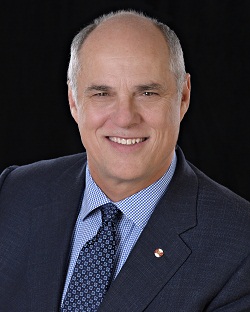Research Awards
Dr. Michael A. Rudnicki
Regenerative Medicine Program
Winner of the Dr. J. David Grimes Research Career Achievement Award
 In his desire to understand how the world around him works, Dr. Michael Rudnicki's first real collaborator was his identical-twin brother, Stephen. "We were forever getting in trouble taking apart clocks, that kind of thing, and not knowing how to put them back together," said Dr. Rudnicki reflecting on his lifelong sense of curiosity that has fuelled an illustrious career of scientific discovery.
In his desire to understand how the world around him works, Dr. Michael Rudnicki's first real collaborator was his identical-twin brother, Stephen. "We were forever getting in trouble taking apart clocks, that kind of thing, and not knowing how to put them back together," said Dr. Rudnicki reflecting on his lifelong sense of curiosity that has fuelled an illustrious career of scientific discovery.
In high school Dr. Rudnicki recalls doing better in the humanities than in math and science, but his curiosity was stoked when he read The Selfish Gene by Richard Dawkins. It introduced him to a gene-centred perspective of evolution. "I was really fired up about that, thinking about genes and DNA and how evolution worked. The ideas really excited me," said Dr. Rudnicki, Senior Scientist at the Ottawa Hospital Research Institute, as well as Director of its Regenerative Medicine Program and the Sprott Centre for Stem Cell Research. "Shortly after this I decided I wanted to go into molecular biology."
Now Dr. Rudnicki is internationally recognized for breaking down the genome, not clocks, to understand the world around him, having occupied a place at the forefront of the field of skeletal muscle development and regeneration for the better part of two decades. He holds the Canada Research Chair in Molecular Genetics, is a professor in the departments of Medicine and of Cellular and Molecular Medicine at the University of Ottawa's Faculty of Medicine, serves as Scientific Director of the Stem Cell Network (among other notable appointments) and of the International Regulome Consortium, and is a founder of Fate Therapeutics, a U.S.-based biopharmaceutical company that is now trading on the NASDAQ.
The list of Dr. Rudnicki's scientific accomplishments is far too long to detail here, having regularly published in top journals. However, here is a whirlwind roundup of some key moments.
In 1992, Dr. Rudnicki helped show that two proteins (MyoD and Myf5), from a family of genes known as transcription factors, can compensate for one another and muscle develops normally when one or the other is missing. In 1993, Dr. Rudnicki showed that when both were missing there was a complete failure of skeletal muscle to develop.
Recognizing that the onset of most muscle-wasting diseases occurs after birth, Dr. Rudnicki turned his attention to the growth and regeneration of adult skeletal muscle. In 1996 he showed that MyoD was necessary for the regeneration of adult muscle. Then in 2000, after returning to his hometown of Ottawa, he published a paper in Cell showing that adults without a protein called Pax7 had no muscle progenitor cells (progenitor cells are like stem cells, but are limited to becoming a certain type of cell, like muscle or fat). Since then, Dr. Rudnicki has continued to study the factors that limit or bolster the population of these stem-like cells in adult muscle.
This led to the discovery of a protein called Wnt7a, which is a catalyst for the expansion of muscle stem cell populations and is currently being developed by Fate Therapeutics as a potential treatment for muscle-wasting diseases, such as Duchenne Muscular Dystrophy.
In 2007, the Rudnicki lab became the first to show the existence and multiple roles of satellite stem cells in adult muscle. When injected into muscle, these cells helped regenerate muscle tissue while also repopulating muscle tissue with muscle stem cells. Once again, the insights of Dr. Rudnicki's team changed the field of muscle biology. Then in 2013, Dr. Rudnicki's group made another landmark breakthrough, becoming the first to show that uncommitted adult muscle stem cells can also become brown fat, an energy-burning form of good fat that could play a critical role in the fight against obesity.
And yet, among all his accomplishments, when Dr. Rudnicki is asked what makes him most proud, without missing a beat he says, "The people who have come through my lab and have established their own careers. The joy of discovery is indeed very satisfying, but as one goes on in this business, it's really about mentoring the next generation."
